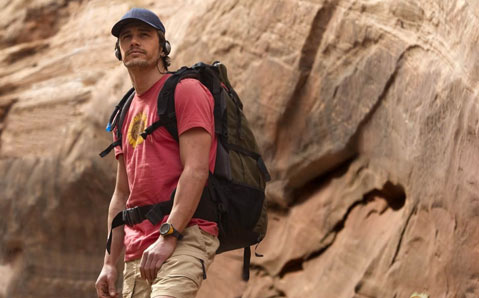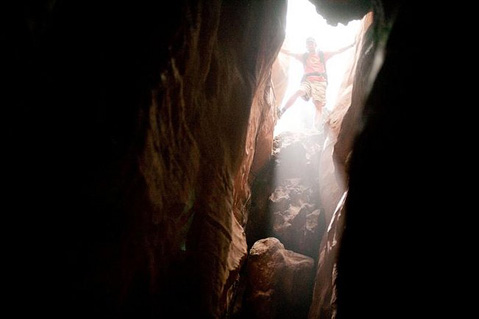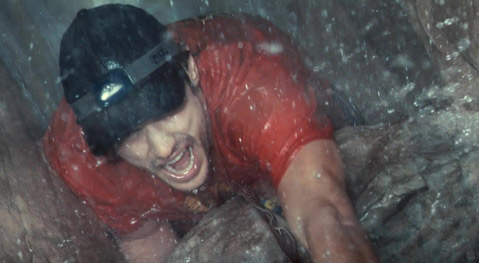127 Hours of Hellish Hope
Chatting Aron Ralston, Arm Amputation, James Franco, and More with Director Danny Boyle

Danny Boyle’s follow-up to his Academy Award-winning Slumdog Millionaire is the film 127 Hours, which depicts the true survival story of Aron Ralston, who was forced to amputate his own arm while pinned beneath a boulder in the mountains around Moab. The film is exhilarating, uplifting, and one of the best of the year. I was fortunate to recently sit down and speak with director Boyle.
When did you realize that this could be a movie? I read Aron’s book in 2006, and I approached him then about making it as this kind of film with an actor playing the part and it being first person. At that stage, he had just finished the book and didn’t want to give up that kind of control. He wanted to try and make it a documentary. … I didn’t think it would work like that. I said the only way you’ll ever be able to depict it properly and for the audience to tolerate what happens at the end of the movie is if you have that empathy with the lead actor that only great actors can give. … He is a kind of a superhero, but we always thought the story is not a superhero story—it’s actually the fact that he is pulled back down to Earth to all of us, to what we all share, and that allows him to get out of there. All his superhuman strength is redundant, which you can see at the beginning of the film when he tries to get out of there. He tries everything, and he can’t, because nature’s grain of sand has literally gone “No, wait,” and that’s what always struck us about the story.

Here’s a story about a trapped man, but he’s constantly moving. Can you talk about your approach? We had this mantra where every day we said to everyone in every way that this is an action movie where the hero is stuck and he can’t move, but he does move. … He’s on this journey about understanding himself. It’s classic drama really, except it’s real. … It was also the relationship James had with the camera which allowed us to give us the sense that this was constantly acted because the danger with a film like this is inertness. You can be still—and James is amazingly still when he leaves the video messages—but you can never be inert. There must always be some spark in there, which is sometimes physical, sometimes emotional. There is a journey going on the whole time before he achieves what I call the grace to get out of there, which is lineage really. In the film, there’s the hallucination of the child. Aron did see this child, but he was 27 and was not interested in being a parent. He was “playing the field” as we say in Britain, and he saw this child, and it wasn’t religious; it wasn’t like Jesus or anything like an epiphany in that sense. It was clearly his kid, and he had this incredible memory of his own father taking him to the Grand Canyon and this lineage idea that he did have a part to play and something important to do other than achieve climbing mountains or achieve records or fast times—he had something to contribute. And that’s how we’re all connected, isn’t it? You pass on life either directly or non-directly, and that gave him the clue to get out of there because, in seeing the kid, he literally worked out that the bone would bend, which he never would have thought of before that. And he did it just like that.

How did you choose James Franco? He looked stoned when we met him. Completely stoned. It wasn’t a good meeting. The casting director at FOX said that was just how he is. In fact, he’s sussing you out; that’s what he does. So we had another meeting in L.A., and he read the scene where he sends a message to his parents about not appreciating them enough, and that was it. It was like a stepping stone. We knew it. He doesn’t look like Aron. James, like me, finds the outdoors deeply threatening. We’re city boys. In fact, we camped out in the desert for a week, and that was weird. It was so silent we thought we had died. I thought I had died in the middle of making a bloody film. I’d lay there, and it’s been 33 years since I’ve been camping. But the story isn’t about the wilderness. James has this amazing quality to enter the space in this relaxed way, like that stoned approach, and he finds that grace to commune. I learned quite a lot about screen acting from him.
Someone said before the film started that they were going to shut their eyes during the arm amputation scene, but I told them the payoff at the end will not be complete if you don’t watch. Did you question how much to include? Obviously, it was going to be difficult, so we followed the book closely. You have to be respectful of it. You can neither push it into horror nor dangerously trivialize it by not showing enough. It took him 40 minutes. His description of pain is something most men will never understand except to observe. The most important thing is that it is a passageway to something else. The danger is that a few people have fainted and then the scene becomes the film, but it’s not. Then you get what we refer to as the Eeyore reaction, which is empathetic and too intense for people. It isn’t the sounds or what’s happening; it’s James acting about the need to keep going somehow. It’s incredible the level he achieves. I’ve only experienced it once when my partner had our child. We talked about it before shooting, and he got it.
I read that you shot the film sequentially. Can you explain why? I had always wanted to do that. I thought it was essential for the story and for James. I didn’t realize that we would evolve with the story as we shot sequentially. We started with the scene when we first tried to get out from the rock and it didn’t work. We filmed a 20-minute scene where James was pounding the rock and then like Aron he drank most of his water in that moment. The water had become a god, and James did the same thing. We then had our style where James would do these long takes where he would dictate. We told Aron we’d be very factual, honest, and true, but we want to make James go through it rather than looking over his shoulder thinking what would Aron do. Our idea was to hand the story back at the end as we see Aron on the couch as James pops up out of the water.
What was Aron’s reaction to the film? We had snuck him into the back of the New Jersey screening, so it didn’t distract anyone. He said afterwards that, when the crowd cheered during the arm-cutting scene, he started to cry because he felt separate from many parts and overwhelmed by others. He has seen it many times and shown his family. To see something like that reenacted? I have no idea how he really feels, but it must be extraordinary. We were filming on the seventh anniversary of his accident, and there was James and several stunt doubles in T-shirts, and he was looking at all these versions of himself in the canyon. I’ve heard he’s writing a book about his reactions, which will be very interesting.
4•1•1
127 Hours opens in Santa Barbara theaters this weekend. For more info, see foxsearchlight.com/127hours.



